Summary 
A cast of nine plus onstage musicians deliver an elegant domestic tragedy but the overall production becomes muddled with an artsy transition to Bohemia and characters - Antigonus, Mamillius, even Leontes - doubled in what could be taken as a mirror or alternate universe. Low-brow humor further confuses an audience that welcomes the poignant finale set in the stiff urbanity of Sicilia.
Design
Directed by Rebecca Taichman. Scenic design by Christine Jones. Costume design by David Zinn. Lighting design by Christopher Akerlind. Compositions by Nico Muhly. Sound design by Matt Tierney.
Cast
Mark Harelik (Leontes/Autolycus), Hannah Yelland (Hermione), Sean Arbuckle (Polixenes), Heather Wood (Mamillius/Time/Perdita), Brent Carver (Camillo), Ted van Griethuysen (Antigonus/Old Shepherd), Nancy Robinette (Paulina), Tom Story (Cleomenes/ Young Shepherd), Todd Bartels (Dion/Florizel).
Analysis
Washington D.C.'s venerable Shakespeare Theatre Company presents an elegantly modern first half of The Winter's Tale, setting the domestic drama within Leontes' formal dinner party, the men arriving in dark suits and the ladies wearing gowns. Director Rebecca Taichman uses a pair of onstage violinists, playing before a looming scarlet curtain and accompanied by piano, as the formal soiree begins. Taichman keeps the entire cast onstage throughout as something of an omnipresent chorus or jury of witnesses, seated at the wooden chairs that line the perimeter of the stage.
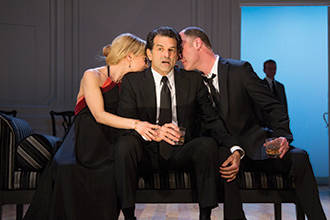
Mark Harelik's debonair Leontes seems the gracious host 1.1, laughing with Polixenes then slow-dancing with the pregnant Hermione - lovely and refined in a shoulderless black gown and short-cropped blonde hair - as his son Mamillius watches nearby in bedroom slippers, pajamas, and a light blue robe featuring a cap with the ears of a bear. By 1.2 the party is a little less elegant, Leontes' tie askew as he play-boxes with Polixenes, then both of them careful not to spill their cocktails as they awkwardly dance at the same time with Hermione. Taichman then freezes the action six times, each moment marked with an echoing tone, party-goers halted in mid-motion except for Harelik's Leontes, who shifts farther with each interlude from observational ("too hot! too hot!") to questioning ("Mamillius, are thou my boy?") to dangerously jealous, his own tall black shadows menacing on the stage wall behind. Finally, the party is over, Leontes yanking his child from his mother as Polixenes walks off with Hermione, her high-heeled dancing shoes in his hands. The other characters move to the seats along the walls as if trapped within Leontes' intimate nightmare of suspicion, and his hurt begins to transform into anger. Harelik's Leontes sputters venom - "my wife is slippery" - and he insults his wife to Camillo - she is "a hobby horse" - and when he rejects Camillo's attempted explanations ("is THIS...nothing?") he is shaking and in tears.
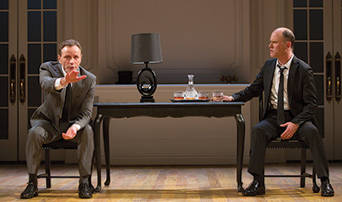
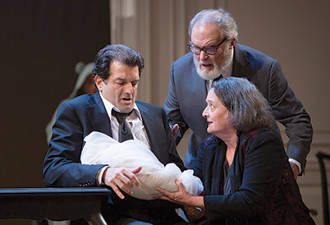
Taichman plays Shakespeare's Act 2 in soft midnight blue, Harelik's Leontes arriving 2.1 with three lawyer-types in business suits to interrupt Hermione and Mamillius playing with a spinning musical top. Harelik, already impressive in a broad arc of emotions, now shows his Leontes struggling to contain vengeful fury, an Othello in no need for an Iago to provoke his jealousy - "I have drunk, and seen the spider" - and he pulls roughly away from Hermione, then again yanks Mamillius from her arms. 2.2 continues in the baleful blue light, Leontes restless stage right as Paulina tries to visit the imprisoned Hermione stage left to the eerie sound effects of rattling chains, a woman's laughter, and rasps of deep breathing. After Paulina guilts him with his infant daughter - "from the GOOD queen" - Taichman cuts to the 3.2 "just and open trial." Harelik's Leontes now assumes the persona of a trial lawyer, giving calm and reasonable discourse directly to the audience - "produce the prisoner" - over an ominous piano score.
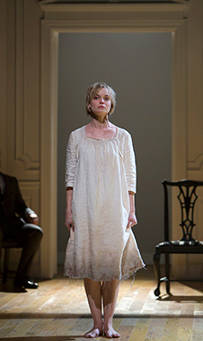
Hannah Yelland's Job-like Hermione simply endures, head down in quiet grace, her hair seeming even shorter, her white dress raggedy and frayed, as Leontes shouts his accusations then forcibly takes her face in his hands. When Harelik's Leontes self-assuredly turns for affirmation to the oracle - a brightly lit scroll that seems to levitate within a glass box upon a dais - his shock is palpable. He begins to laugh as he reads - "Leontes is a tyrant" - and when he tries to deny the gods - "there is no truth in all the Oracle" - there is a flash of bright light, Mamillius screams offstage, an ominous tone resounds, and Hermiones faints and appears to pass away. Harelik's Leontes observational "Apollo is angry" draws bemused laughter from the audience, which has been mesmerized by expertly performed domestic tragedy for over an hour.
But after Leontes falls to his knees in realization of Polixenes' innocence - "how he glisters through my rust" - and with grief at the announcement that Hermione has died, Taichman alternates artsy surrealism with lowbrow rustic humor in an awkward (at best) transition to Shakespeare's middle scenes in Bohemia. 3.3 begins well with an enchanting visual, the ghosts of Hermione and Mamillius walking slowly downstage in deep blue lighting, a long white cloth wavering between them, and they lift and twist it so the cloth billows like a ship's sail in a breeze. They stand at opposite sides of downstage as thunder echoes and lightning flashes, the Sicilian chairs overturned to represent the wreckage of a storm. In a surreal lighting effect, certainly befitting the understated elegance of the production - so far - raindrops in water puddles project across the stage and walls as Antigonus enters, a briefcase in one arm and a swaddled infant in the other.
The production takes an unfortunate turn at this point, with the sound effect of a threatening bear, then a looming dark shadow, and finally a man in a bear suit appears in an upstage doorway. The bear rises to roar then chases in a comical lumber after Antigonus - "exit, pursued by a bear" - that elicits laughter. Worse, Antigonus immediately returns, confusing the audience, and he is now the Old Shepherd in a green sweater under green lights to discover the infant child Perdita. Something of an alternate reality, or perhaps a mirror universe, is hinted at - or is this just clumsy doubling - and the tone downshifts to low-brow humor as the Young Shepherd come screaming onstage (literally), running past the upstage doors twice before finding his way downstage. The already startled audience then watches as Camillo dances onstage with a large wooden butterfly colorfully painted at the end of a long stick with which he can gently flap its wings. The jarring performance-art - Camillo guides the butterfly up and down as if in flight, a violinist trailing behind him - brings intermission.
Taichman's second act begins with more hints at an alternate reality mirroring the first act tragedy in Sicilia. The young actress Heather Wood takes the stage, still wearing Mamillius's fluffy bathrobe, but reveals herself not just as Time personified - sixteen years have passed - but as Perdita herself, an apparent reincarnation as she removes pajamas and unleashes long blonde hair before Hermione appears to drop a flowery pink dress over her shoulders. When the characters from Sicily enter 4.1 and begin donning Bohemian garments, the audience scratches its collective head, and Harelik's Leontes pulls on shiny black and blue slacks along with a magician's cape to become the pirate-like thief Autolycus, complete with eye patch and flask, his boots untied and his shirt untucked. One wonders if Bohemia is meant as a rural and colorful freedom within the same characters that populated the black-and-white urban rigidity of Leontes' Sicilia, especially when a musician enters playing an accordion, leading cast members carrying more painted butterflies on sticks, cut-outs of sheep, and an upstage mural of a green pasture beneath a blue sky.
Harelik delivers an exceptional overall performance, his Sicilian Leontes a disintegrating mess of angry emotions, and in Bohemia he adds considerable swash to his buckle to deliver a Johnny Depp-style pirate rogue Autolycus. He strips and conceals himself 4.3 from the grocery-list bearing Young Shepherd, then lurches forward to pick the clown's pocket - from a pink fanny pack - then take the fanny pack itself in a showy hug goodbye. 4.4 reveals Perdita and Florizel in love, watched by the disguised old men, she an Ophelia-like hippie flower child - "there's rosemary" - without the suicidal undertones, and he an acid-trip psychedelic lovebird in orange pants and matching jacket. Even Paulina seems mirror-imaged here as something of an earth goddess - Grunge lives - in sneakers and sweatpants, a flannel shirt and a ski cap. Certainly the high-art approach works better - butterflies and music - although Leontes' Autolycus sings beautifully, accompanied by a falsetto from the Young Shepherd - in brown coveralls, t-shirt, and a backward baseball cap - that surprises everyone, including the boy himself.
While Polixenes' harsh anger at Florizel for marrying without his consent echoes the same selfish over-the-top anger that infused Leontes' first act jealousy, little seems to make narrative sense in Bohemia other than an opportunity for Leontes to redeem himself. Camillo graciously helps the Old Shepherd stand with his cane, and Autolycus changes clothes with Florizel, donning a beret and sunglasses and an outrageously lisping accent like a decadent French film director, his simple men and curses becoming "thimple men" and "curtheth." 5.1 brings a return to Sicilia that is paradoxically welcome, and the performers again pause to slowly change their garments and return to their original characterizations. Harelik's Leontes kneels to embrace the children so they will face the charges from Polixenes together, then each actor takes a turn as Chorus to continue the tale. For 5.2 Harelik must briefly return to his wig and eye-patch, singing as Autolycus on his knees in a spot. The father-and-son Shepherds approach, both now wearing suits and ties, but with a floppy fisherman's hat and a still-backward baseball cap.
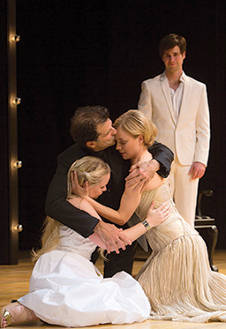
Taichman's concluding 5.3 has the stage opening deep like a museum, the sculpture of Hermione visible, back muscles in relief like marble in white light. Lit from fixtures hanging at uneven levels, the sculpture amazes Harelik's Leontes - "what fine chisel could cut breath?" - and after an unearthly shimmer of the lighting as if from a mild earthquake, Paulina advises them - "awake your faith" - and urges the statue to life: "be still no more." When Hermione moves, ever so slightly, they all gasp and take a step backward, but Leontes quickly re-approaches, and when Hermione reaches a hand toward him, he takes it - "oh, she's warm!" - and embraces her. The reunions are complete - as are the unions, with Leontes placing Camillo's hand in Paulina's - and after a moving embrace of mother with daughter, Leontes shows his contrition by gesturing to Polixenes and asking his wife, "look upon thy brother." They each take Leontes' hand in a heartwarming conclusion to an at times excellent and at times frustratingly abstruse production.